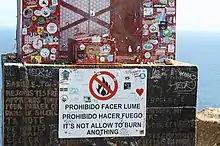阿羅馬尼亞語
其他寫法
詞源
名詞
相關詞彙
參見
- , , ,
愛沙尼亞語
名詞
芬蘭語
詞源
發音
- 國際音標(幫助):/ˈlumeˣ/, [ˈlume̞(ʔ)]
名詞
變格
| lume (Kotus 變格類型 48/hame,無層級變化)的變格 | |||
|---|---|---|---|
| 主格 | |||
| 屬格 | |||
| 部分格 | |||
| 入格 | |||
| 單數 | 複數 | ||
| 主格 | |||
| 賓格 | nom. | ||
| gen. | |||
| 屬格 | |||
| 部分格 | |||
| 內格 | |||
| 出格 | |||
| 入格 | |||
| 所格 | |||
| 奪格 | |||
| 向格 | |||
| 樣格 | |||
| 變格 | |||
| 具格 | — | ||
| 缺格 | |||
| 共格 | — | ||
| lume 的所有格形式 (變格類型 hame) | ||
|---|---|---|
| 所有者 | 單數 | 複數 |
| 第一人稱 | ||
| 第二人稱 | ||
| 第三人稱 | ||
複合詞
異序詞
加利西亞語

lume

prohibido facer lume
詞源
發音
- 國際音標(幫助):[ˈlu.mɪ]
名詞
m (複數)
- 火,焰
- 〈旧〉 光
- 1370, Ramón Lorenzo (ed.), Crónica troiana. A Coruña: Fundación Barrié, page 689:
- ca despois que anoyteçeu tornou outrosí escuro speso a sobreguisa, et nõ fazía luar nẽ lume, pouco nẽ mais.
- because after nightfall it became dark, and this darkness was exceedingly thick, and it was neither moonlight nor light, no less or more
- ca despois que anoyteçeu tornou outrosí escuro speso a sobreguisa, et nõ fazía luar nẽ lume, pouco nẽ mais.
- 1370, Ramón Lorenzo (ed.), Crónica troiana. A Coruña: Fundación Barrié, page 689:
- 林火
- 1990, Xaquín Fernández Leiceaga, Economia (politica) do monte galego, page 103:
- A hipótese básica é que os lumes, por máis que sexan intencionados, non obedecen a unha lóxica económica de potencia irregular de ano en ano, senón a causas continuamente presentes
- The basic hypothesis is that forest fires, even being caused intentionally, don't follow year after year an economic logic of irregular potential, but instead causes that are continuously present
- A hipótese básica é que os lumes, por máis que sexan intencionados, non obedecen a unha lóxica económica de potencia irregular de ano en ano, senón a causas continuamente presentes
- 1990, Xaquín Fernández Leiceaga, Economia (politica) do monte galego, page 103:
派生詞
參考資料
- “lume” in Dicionario de Dicionarios do galego medieval, SLI - ILGA 2006-2012.
- “lume” in Xavier Varela Barreiro & Xavier Gómez Guinovart: Corpus Xelmírez - Corpus lingüístico da Galicia medieval. SLI / Grupo TALG / ILG, 2006-2016.
- “lume” in Dicionario de Dicionarios da lingua galega, SLI - ILGA 2006-2013.
- "lume" in Tesouro informatizado da lingua galega. Santiago: ILG.
- “lume” in Álvarez, Rosario (coord.): Tesouro do léxico patrimonial galego e portugués, Santiago de Compostela: Instituto da Lingua Galega.
意大利語
詞源
發音
- 國際音標(幫助):/ˈlu.me/, [ˈl̺uːme]
- 斷字:lù‧me
名詞
m (複數)
- 光源
- 1321, , [The Divine Comedy: Purgatory] (paperback), Bompiani, 出版於 2001, Canto XXII,頁號 336,行號s 67–69:
- Facesti come quei che va di notte, ¶ che porta il lume dietro e sé non giova, ¶ ma dopo sé fa le persone dotte, […]
- Thou didst as he who walketh in the night, ¶ who bears his light behind, which helps him not, ¶ but wary makes the persons after him, […]
- 1353, , “Seconda giornata, Novella VII [Second Day, 7th Story]”, 出自 [Decameron], Tommaso Hedlin, 出版於 1527,頁號 50:
- Pericone non diede indugio a ſeguitarla, ma ſpento ogni lume preſtamente da laltra parte le ſi coricò al lato […]
- Pericone was not slow to follow her, but, putting out every light, promptly hid himself beside her […]
- 〈旧〉 非電力的光源(如蠟燭、煤油燈)
- 1840, , 章號 XXXIII, 出自 , Tip. Guglielmini e Redaelli,頁號 626:
- “ […] C’era una vernaccia!... Ma, con una buona dormita, tutto se ne va. Ho un gran sonno... Levami un po’ quel lume dinanzi, che m’accieca... mi dà una noia...!”
- “ […] The wine was so fine!... With a good sleep all will be well again. I am overcome by sleep... Get that lamp away from before me, it's blinding me... it troubles me so...!”
- 〈罕〉 電力光源
- 〈引〉〈詩〉 星
- 1472, , [The Divine Comedy: Paradise] (paperback), Le Monnier, 出版於 2002, Canto II,頁號 39,行號s 64–66:
- La spera ottava vi dimostra molti ¶ lumi, li quali e nel quale e nel quanto ¶ notar si posson di diversi volti.
- Lights many the eighth sphere displays to you ¶ which in their quality and quantity ¶ may noted be of aspects different.
- 1374, , “Tacer non posso, et temo non adopre [I can’t be silent, yet I fear to use]”, 出自 , Florence: Andrea Bettini, 出版於 1858,頁號 349:
- Fra tanti amici lumi, ¶ una nube lontana mi dispiacque; ¶ la qual temo che 'n pianto si risolve, […]
- Among so many friendly stars, ¶ one distant cloud displeased me: ¶ which I fear will melt away in tears
- 近義詞: 、
- 〈喻〉〈詩〉 上帝
- 1472, , [The Divine Comedy: Purgatory] (paperback), Bompiani, 出版於 2001, Canto XIII,頁號 195,行號s 85–87:
- Volsimi a loro e: «O gente sicura», ¶ incominciai, «di veder l'alto lume ¶ che 'l disio vostro solo ha in cura […] »
- To them I turned me, and, "O people, certain," ¶ began I, "of beholding the high light, ¶ which your desire has solely in its care, […]
- 〈喻〉〈引〉〈詩〉 神聖的靈魂或實體
- 1472, , [The Divine Comedy: Paradise] (paperback), Le Monnier, 出版於 2002, Canto X,頁號 179,行號s 71–73:
- si trovan molte gioie care e belle ¶ tanto che non si posson trar del regno; ¶ e 'l canto di quei lumi era di quelle;
- Are many jewels found, so fair and precious ¶ they cannot be transported from the realm; ¶ and of them was the singing of those lights;
- 〈喻〉〈引〉〈詩〉〈文〉 受尊敬的人
- 16世紀, , transl., [Aeneid], Florence: Leonardo Ciardetti, translation所著的Aeneis, 出版於 1827, Libro I,頁號 102:
- Cadde Riféo, ch'era ne' Teucri un lume ¶ di bontà, di giustizia e d'equitate
- Ripheus fell, who was a light among the Teucrians ¶ for goodness, justice and equity
- 1472, , [The Divine Comedy: Hell], 12th版 (paperback), Le Monnier, 出版於 1994, Canto I,頁號 13,行號s 82–84:
- «O de li altri poeti onore e lume, ¶ vagliami 'l lungo studio e 'l grande amore ¶ che m'ha fatto cercar lo tuo volume.»
- "O, of the other poets honour and light, ¶ avail me the long study and great love ¶ that have impelled me to explore thy volume!
- c. 1527, , [Orlando in Love], Milano: Società Tipografica de' Classici Italiani, 出版於 1828, Canto XIII,頁號 37:
- A que' tre che tu, Fiorenza, onori ¶ eterni lumi della lingua nostra, […]
- To those three that you, Florence, honour, ¶ eternal lights of our own language […]
- 光,尤指:
- 〈古〉〈文〉 自然光
- 1472, , [The Divine Comedy: Purgatory] (paperback), Bompiani, 出版於 2001, Canto I,頁號 10,行號s 37–39:
- Li raggi delle quattro luci sante ¶ fregiavan sì la sua faccia di lume ¶ ch'i' 'l vedea come 'l sol fosse davante.
- The rays of the four consecrated stars ¶ did so adorn his countenance with light, ¶ that him I saw as were the sun before him.
- 1909, , “La capinera [The Blackcap]”, 出自 Nuovi poemetti, 4th版, Bologna: Nicola Zanichelli, 出版於 1918,頁號 29,行號s 7–9:
- Il cinguettìo, così tra lume e scuro, ¶ cessò d’un tratto. Era comparso il sole. ¶ Sparì ciascuno nel bel giorno puro.
- The chirping, between light and darkness ¶ ceased suddenly. The Sun had risen. ¶ They all disappeared into the pure day.
- 近義詞:
- 〈旧〉 (人造的,非電力的)光
- 〈古〉〈文〉 自然光
- (繪畫) 光投射到圖畫上的方式
- 〈喻〉 視力
- 1516, , Orlando Furioso [Raging Roland], Venice: Printed by Gabriel Giolito, 出版於 1551, Canto XLIII,頁號 205:
- e facea alcun effetto ſopr'humano; ¶ dar lume a ciechi, e tornar morti a vita; ¶ fermare il uento ad un ſegno di croce ¶ e far tranquillo il mar, quand'è piu atroce.
- [a hermit] who had done superhuman deeds; ¶ regiving sight to the blind, and restoring the dead to life; ¶ hushing the winds with a sign of the cross ¶ and pacifying the sea when at its scariest.
- 近義詞:
- 〈〉 雙眼
- 1374, , “I' vidi in terra angelici costumi [I saw angelic virtue on earth]”, 出自 , Florence: Andrea Bettini, 出版於 1858,頁號 157,行號s 5–8:
- E vidi lagrimar que' duo bei lumi, ¶ c'han fatto mille volte invidia al Sole; ¶ ed udii sospirando dir parole ¶ che farian gir i monti e stare i fiumi.
- And I saw two lovely eyes that wept, ¶ that made the sun a thousand times jealous; ¶ and I heard words emerge among sighs ¶ that made the mountains move, and halted rivers.
- 1581, , [Jerusalem Delivered], Erasmo Viotti, Canto LX,頁號 372:
- e cadde tramortita: e ſi diffuſe ¶ di gelato ſudore: e i lumi chiuſe.
- and she fell to the ground, stunned, getting covered ¶ with freezing sweat, and closed her eyes.
- 1835, , “I. All'Italia [To Italy]”, 出自 , Bari: Einaudi, 出版於 1917,頁號 7,行號s 134–136:
- Ché, se il fato è diverso, e non consente ¶ ch’io per la Grecia i moribondi lumi ¶ chiuda prostrato in guerra, […]
- If fate’s opposed, and will not consent that I fall in war, and close my dying eyes, for Greece, […]
- 近義詞:
- 〈喻〉 啟蒙,啟迪
- 1472, , [The Divine Comedy: Purgatory] (paperback), Bompiani, 出版於 2001, Canto VI,頁號 86,行號s 43–45:
- Veramente a così alto sospetto ¶ non ti fermar, se quella non ti dice ¶ che lume fia tra 'l vero e lo 'ntelletto.
- Verily, in so deep a questioning ¶ do not decide, unless she tell it thee, ¶ who light 'twixt truth and intellect shall be.
- 〈〉 基於理性建立起來的文化
- 1764, , “V. Oscurità delle leggi [Of the Obscurity of Laws]”, 出自 Dei delitti e delle pene [On Crimes and Punishments], Paris: Dal Molini, 出版於 1780,頁號 21:
- Da ciò veggiamo quanto sia utile la stampa, che rende il pubblico, e non alcuni pochi, depositario delle sante leggi, e quanto abbia dissipato quello spirito tenebroso di cabala e d’intrigo, che sparisce in faccia ai lumi ed alle scienze […]
- Hence we see the use of printing, which makes the public, and not a few individuals, the guardians of the sacred laws, and how it has dissipated the gloomy spirit of cabal and intrigue, which disappears in the face of enlightenment and sciences […]
- 〈喻〉(多用複數) 建議,有用的信息
- 1881, , , Fratelli Treves, 出版於 1907, Chapter VII,頁號 113:
- La seduta fu sciolta senza concludere nulla. Il segretario voleva un po’ di tempo per prender lume;
- The meeting was closed without deciding upon anything. The clerk wanted time to get up his subject.
- 近義詞: 、
- 〈引〉 洞察力
- 1472, , [The Divine Comedy: Purgatory] (paperback), Bompiani, 出版於 2001, Canto XVI,頁號 237,行號s 73–75:
- Lo cielo i vostri movimenti inizia; ¶ non dico tutti, ma, posto ch'i' 'l dica, ¶ lume v'è dato a bene e a malizia
- The heavens your movements do initiate, ¶ I say not all; but granting that I say it, ¶ light has been given you for good and evil
- 近義詞:
- 〈解〉 內腔
- (捕魚) 網眼大小
派生詞
相關詞彙
異序詞
中古英語
名詞
葡萄牙語
詞源
源自古葡萄牙語 ← 拉丁語 ← 原始印歐語 ← 。與加利西亞語 , 西班牙語 , 加泰羅尼亞語 , 奧克語 , 法語 , 意大利語 , 羅馬尼亞語 同源。“內腔”是現代新起義。參見借詞。
發音
- (PT) 國際音標(幫助):/ˈlu.mɨ/
- 斷字:lu‧me
名詞
m (複數)
近義詞
相關詞彙
羅馬尼亞語
詞源
源自拉丁語 (“光”)(比喻義“生命之光”),源自原始印歐語 ,派生自詞根 (“明亮”)。對比教會斯拉夫語 (světŭ, “光;世界”);匈牙利語 ,原義為“光”。參見。
發音
- 國際音標(幫助):[ˈlu.me]
名詞
f (複數)
變格
近義詞
相關詞彙
參見
- pământ
拓展閱讀
- 《羅馬尼亞語詞典》(DEX online - Dicționare ale limbii române)中有關lume的內容
This article is issued from Wiktionary. The text is licensed under Creative Commons - Attribution - Sharealike. Additional terms may apply for the media files.